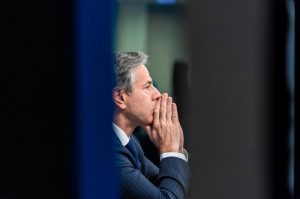WASHINGTON — The United States on Wednesday played down expectations of any breakthrough from the first trip by a US Secretary of State to China in five years, after a tense call with China’s foreign minister ahead Antony Blinken’s visit to Beijing next week.
Chinese foreign minister Qin Gang urged the United States to stop meddling in its affairs and harming its security in a call with Mr. Blinken on Wednesday, and said it should respect China’s core concerns to arrest declining relations between the superpowers, China’s foreign ministry said.
Having postponed a February trip after a suspected Chinese spy balloon flew over US airspace, Mr. Blinken is set to become the highest ranking US government official to visit China since President Joseph R. Biden took office in January 2021.
US officials said Mr. Blinken would push to establish open communication channels to ensure competition with the Chinese does not spiral into conflict.
“We’re not going to Beijing with the intent of having some sort of breakthrough or transformation in the way that we deal with one another,” Daniel Kritenbrink, the State Department’s top diplomat for East Asia, told reporters in a briefing call.
“We’re coming to Beijing with a realistic, confident approach and a sincere desire to manage our competition in the most responsible way possible,” he said.
Mr. Kritenbrink said he expected Mr. Blinken would “reiterate America’s abiding interest in the maintenance of peace and stability across the Taiwan Strait” and also discuss the situation in Ukraine.
Mr. Blinken’s long-delayed visit is aimed at stabilizing relations between the world’s two largest economies and strategic rivals. Ties have deteriorated across the board and raised concerns they might one day clash militarily over the self-ruled island of Taiwan, which China claims as its own.
The two sides are also at odds over trade, US efforts to hold back China’s semiconductor industry and human rights issues.
Chinese state media said Mr. Blinken would visit on June 18 and 19. Mr. Kritenbrink said Mr. Blinken would hold a series of meetings with senior Chinese officials.
The two sides did not say which officials Mr. Blinken would meet. Asked at a regular briefing it he would meet President Xi Jinping, US State Department spokesperson Matthew Miller said:
“I won’t speak to any potential meetings, other than to say we’ll have announcements about who he will be meeting with and when over the next few days.”
CRISIS COMMUNICATION
Sources familiar with the planning said Mr. Blinken had been expected to meet Mr. Xi on the canceled February trip.
A primary objective for Mr. Blinken will be “candid, direct and constructive” discussions with China, Mr. Kritenbrink said, but he cautioned about the prospect of progress.
“There will be a substantive and productive agenda that we’ll have before us, but, again, the objective is to focus on those top line goals, not necessarily to produce a long list of deliverables,” he said.
One alarming aspect of the sour ties has been Beijing’s reluctance to have open military-to-military dialogue with Washington, despite repeated US attempts.
White House Indo-Pacific Coordinator Kurt Campbell said in the same call that Washington has an interest in setting up crisis communication mechanisms to reduce conflict risk.
“I believe Secretary Blinken will advocate strongly that these lines of communication are necessary. They are how mature, strong militaries interact and the stakes are just too high to avoid these critical lines of communication,” he said.
US officials expect Mr. Blinken’s visit will pave the way for more bilateral meetings, including possible trips by US Treasury Secretary Janet Yellen and Commerce Secretary Gina Raimondo, in the coming months. Mr. Campbell said “a series of visits in both directions” were expected “in the period ahead,” but did not elaborate.
US President Joseph R. Biden and Mr. Xi held their first face-to-face leadership talks on the sidelines of the G20 summit in Bali in November.
In three-and-a-half hours of talks, they covered topics including Taiwan and nuclear-armed North Korea, but the meeting ultimately failed to ease tensions.
The balloon episode and exchanges of visits by US and Taiwanese officials have magnified US-China tensions.
“Since the beginning of the year, Sino-US relations have encountered new difficulties and challenges, and the responsibility is clear,” Qin told Mr. Blinken, according to the Chinese foreign ministry’s readout.
The United States should “stop interfering in China’s internal affairs, and stop harming China’s sovereignty, security and development interests in the name of competition,” Qin Gang added. — Reuters

